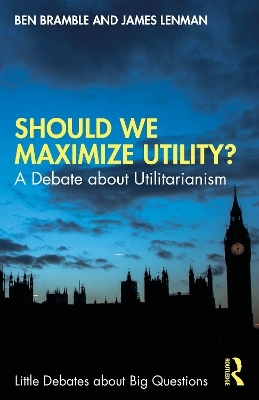
Should We Maximize Utility?
Routledge (Verlag)
978-1-032-29104-8 (ISBN)
- Noch nicht erschienen (ca. Februar 2025)
- Versandkostenfrei
- Auch auf Rechnung
- Artikel merken
Utilitarianism directs us to act in ways that impartially maximize welfare or utility or at least aim to do that. Some find this view highly compelling. Others object that it has intuitively repugnant results; that it condones evildoing and injustice; that it is excessively imposing and controlling; that it is alienating; and that it fails to offer meaningful practical guidance.
In this ‘Little Debates’ volume, James Lenman argues that utilitarianism’s directive to improve the whole universe on a cosmic time scale is apt to lead it down a path of imperious moral overreach. The project, he further maintains, ultimately shipwrecks on an extreme lack of epistemic humility in framing the determinants of what is morally right and wrong beyond the limits of what we can ever hope to know. Utilitarianism thus leaves us morally clueless. In contrast, Ben Bramble seeks to develop and defend an original form of utilitarianism, less vulnerable than other, more familiar versions to a number of important objections, including those raised by Lenman. He aims to avoid such unappealing results by presenting it as a claim about what we have the most reason to do, and not as a theory of right action, which Bramble urges we should understand quite differently by reference to what would motivate virtuous people.
Key Features:
Focuses on one of the dominant ethical theories debated by moral philosophers today
Clearly written, free of jargon and technicality, and highly accessible to students
Addresses questions of great importance to anyone wishing to grow in understanding of human moral life
Provides a glossary of key terms highlighted in bold as well as a bibliography for further reading
Important issues discussed include: welfare; value; right action; virtue; impartiality; obligations to non-human animals; the badness of human extinction; the happiness of future people; the ethics of climate change; the long term future; and the moral significance of the limits to what we can know.
Ben Bramble is a Lecturer in Philosophy at the Australian National University, and a Mission Specialist at ANU’s Institute for Space. He is the author of The Passing of Momentary Well-Being (Routledge, 2018), Pandemic Ethics (Bartleby Books, 2020), and numerous articles including “The Defective Character Solution to the Non-Identity Problem” (The Journal of Philosophy, 2021). James Lenman is Professor of Philosophy at the University of Sheffield. He has published many articles mostly on metaethics and normative ethics and a book, The Possibility of Moral Community (Oxford UP, 2024). Roger Crisp is Professor of Moral Philosophy at Oxford University.
Foreword by Roger Crisp I. Against Utilitarianism 1. Utilitarianism and its Discontents 2. Goodness 3. Welfare 4. Repugnant Conclusions 5. Intuitions 6. Cluelessness 7. Cluelessness and the Climate 8. Beyond Utilitarianism II. For Utilitarianism 1. Introduction 2. Total or Person-Affecting Utilitarianism? 3. Philosophy of Swine 4. Cluelessness 5. Reasons or Requirements? 6. Demandingness 7. The Alienation Objection 8. The ‘Harming to Help’ Objection 9. Conclusion III. Reply to Bramble IV. Response to Lenman Further Reading References.
| Erscheint lt. Verlag | 15.2.2025 |
|---|---|
| Reihe/Serie | Little Debates about Big Questions |
| Zusatzinfo | 2 Line drawings, black and white; 2 Illustrations, black and white |
| Verlagsort | London |
| Sprache | englisch |
| Maße | 138 x 216 mm |
| Themenwelt | Geisteswissenschaften ► Philosophie ► Ethik |
| Geisteswissenschaften ► Religion / Theologie | |
| ISBN-10 | 1-032-29104-4 / 1032291044 |
| ISBN-13 | 978-1-032-29104-8 / 9781032291048 |
| Zustand | Neuware |
| Haben Sie eine Frage zum Produkt? |
aus dem Bereich


